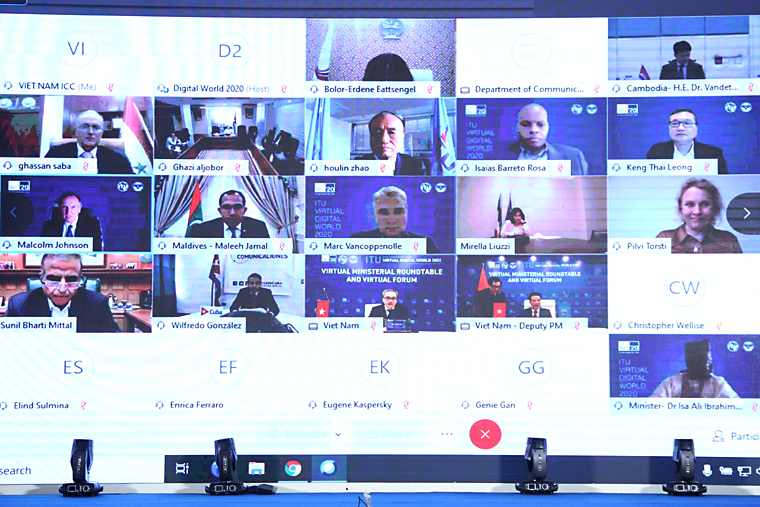
Mr. Antonio Nunes, CEO of Angola Cable, a multinational telecommunications group from Angola, noted that the Internet has become an essential part of everyone's life.
“We need infrastructure to promote economic growth. Without the Internet, the telecommunications infrastructure, we would not be able to trade during the Covid-19 epidemic. If we continue to digitize, we will be able to maintain economic growth. For people, they can work anywhere without going to the company,” Nunes said.
Ms. Angela Siefer, Executive Director of the National Digital Inclusion Alliance (NDIA), said that awareness of ensuring fairness in digital access is gradually improving. This is recognized in both federal and state agencies in the United States.
In the United States, many state governments have begun working towards building networks to ensure the availability of the Internet and the accessibility of the people, that it be accessible to everyone. This is very important because once perceptions change, people will not be able to go backwards but can only move forward.
For Vietnam, Mr. Thieu Phuong Nam, General Director of Qualcomm Indochina, said the Vietnamese government is very active in promoting digital transformation nationwide.
The Ministry of Information and Communications of Vietnam has also issued policies aimed at each person to have a smartphone and each household to have a broadband optical cable transmission line. This is how Vietnam makes the Internet accessible to all people.
The digital gap is a barrier to growth
Mr. Stewart White, CEO of AKHET Consulting, said that if you look at the unemployment rate caused by Covid-19, the weak telecommunications infrastructure is also the cause of the high unemployment rate.
In areas where Wi-Fi and optical fiber cable are not available, it is difficult for people to work remotely. On the whole, they were at a disadvantage compared to colleagues working in places with Wi-Fi and optical fiber cable. For students, the lack of access to the Internet will make it difficult for them to keep up with the school program because of the loss of online learning opportunities.
According to Ralph Mupita, CEO of South Africa's MTN network, telecommunications infrastructure must stand at a high position in the list of demands of the people.
During the crisis caused by Covid-19, millions of people around the world had no access to the Internet. People in remote areas have suffered more disadvantages due to the difficulty of accessing health care and education services caused by geographical distances.
This gap will be gradually narrowed if these people have access to telecommunications infrastructure. Therefore, it is necessary to bring Internet access opportunities to remote and disadvantaged areas.
Many experts said that the "digital gap" is rooted in the fact that private enterprises always want high profit margins, while service provisions to disadvantaged groups have not brought about good profits as expected.
Commercial pressure is one of the main reasons why the world cannot fulfill its goal of erasing the digital gap. Many firms see a market gap but are still hesitant to make investment decisions.
Businesses also expect the stability of the legal environment and the potential of the market if they study long-term investment. To solve this problem, it is necessary to promote the public-private partnership model, in which the state must have appropriate mechanisms and policies to encourage and support enterprises.
Together, the world must narrow the digital gap
In general, at the conference, both domestic and foreign experts agreed with the statement that this is the time when the world must join hands to define priorities to speed up the popularization of broadband and narrow the digital gap.
According to Houzin Zhao, ITU Secretary General, similar to water and air, the connection to the Internet and communication are fundamental rights that help ensure people's lives.
“Unlike electricity and water, the telecommunications, broadband Internet market is very competitive with the positive participation of the private sector. Therefore, we absolutely have the opportunity to invest to improve the quality of infrastructure and expand the network. In order to do this, it is necessary to have coordination mechanisms from the government,” said Mr. Houzin Zhao.
In this process, government agencies play a central role in setting incentives, for example incentives in the form of grants, sponsorships, guarantees, setting standards, regulations, and mechanisms to support businesses.
To close the digital gap, what governments need to do is increase user access and technology availability.
In particular, accessibility must be improved by developing digital skills and popularizing these skills to groups of children and the elderly. In this regard, more than ever, the participation of the entire community is extremely important.
By increasing the availability of technology, this can be improved by using satellite transmission technology to bring broadband Internet to remote areas. In addition, it is necessary to increase coverage of 3G, 4G and develop other technologies to expand coverage.
In addition, it is necessary to develop affordable mobile device models (priced less than $20) and reduce service costs so that all citizens can use the Internet.
Many experts also suggested applying a certain level of criteria to the number of affordable services. This is similar to the fact that in some places, the number of social housing must account for about 30% of the total number of apartments in a housing project.
Only when the availability of technology and the accessibility of the users are enhanced will the digital gap in the world be narrowed.
